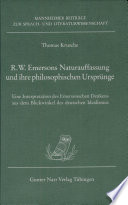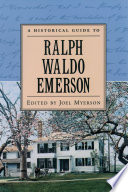 Alone in all history, he estimated the greatness of man. One man was true to what is in you and me. He saw that God incarnates himself in man, and evermore goes forth anew to take possession of his world. Alone in all history, he estimated the greatness of man. One man was true to what is in you and me. He saw that God incarnates himself in man, and evermore goes forth anew to take possession of his world.  Nature: Addresses, and Lectures - Page 108by Ralph Waldo Emerson - 1883 - 315 pagesFull view Nature: Addresses, and Lectures - Page 108by Ralph Waldo Emerson - 1883 - 315 pagesFull view - About this book
 | Sacvan Bercovitch - 1974 - 280 pages
...all history he estimated the greatness of man. One man was true to what is in you and me. He saw that God incarnates himself in man, and evermore goes forth...anew to take possession of his World. He said, in dais jubilee of sublime emotion, 'I am divine. Through me, God acts ; through me, speaks. Would you... | |
 | Richard H. Brodhead - 1986 - 196 pages
...chant from the poet's lips"), the true intent of which was not merely to say "I am divine" but that "God incarnates himself in man, and evermore goes forth anew to take possession of his world." Hence "Christianity became a Mythus, as the poetic teaching of Greece and of Egypt, before." To be... | |
 | Thomas Krusche - 1987 - 384 pages
...history, he estimated the greatness of man. One man was true to what is in you and me. He saw that God incarnates himself in man, and evermore goes forth...God acts; through me, speaks. Would you see God, see me;or, see thee, when thou also thinkest äs I now think. So wie Jonathan Edwards' Ankämpfen gegen... | |
 | William Carl Placher - 1988 - 230 pages
...history, he estimated the greatness of man. One man was true to what is in you and me. He saw that God incarnates himself in man, and evermore goes forth...But what a distortion did his doctrine and memory surfer in the same, in the next, and in the following ages! ... He spoke of miracles; for he felt that... | |
 | George Monteiro - 1988 - 196 pages
...the history of this world," insisted: "One man was true to what is in you and me. He [Jesus] saw that God incarnates himself in man, and evermore goes forth anew to take possession of his world."16 Such fervent stands on behalf of man and his freedom, and deaths suffered on behalf of freedom,... | |
 | Richard G. Geldard - 1999 - 200 pages
...holy writ and then offer an interpretation. Emerson the strong reader feels free to strongly rewrite: "I am divine. Through me, God acts; through me, speaks....see thee, when thou also thinkest as I now think." What devout Christians do with this passage ultimately depends upon their own experience and some attention... | |
 | Jaroslav Pelikan - 1999 - 308 pages
...greatness of man. One man was true to what is in you and 204 The Poet of the Spirit me. He saw that God incarnates himself in man, and evermore goes forth...see thee, when thou also thinkest as I now think." Therefore, Emerson went on to say, "it is the office of a true teacher to show us that God is, not... | |
 | Roger Lundin, Anthony C. Thiselton, Clarence Walhout - 1999 - 280 pages
...the pronouncements of Hegel's intellectual descendants. Emerson declared with blithe confidence that "God incarnates himself in man, and evermore goes forth anew to take possession of his world"; for Nietzsche, the true interpreter is an artist, one who refuses to "[lie] in the dust before petty... | |
 | William E. Cain - 2000 - 298 pages
...estimated the greatness of man. One man was true to what is in you and me. He saw that God 1ncarnates himself in man, and evermore goes forth anew to take...see thee, when thou also thinkest as I now think." (Essays and Lectures, 80 ) Parker, in "A Discourse of the Transient and Permanent in Christianity"... | |
 | Joel Myerson - 2000 - 336 pages
...the divinity within every individual. Emerson thus radically democratized Jesus' claim of divinity: "He said, in this jubilee of sublime emotion, 'I am...see thee, when thou also thinkest as I now think'" (CW, 1:81). Emerson was inviting controversy with these remarks, but he saw himself as an awakener,... | |
| |